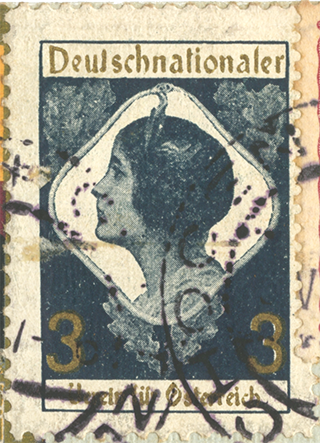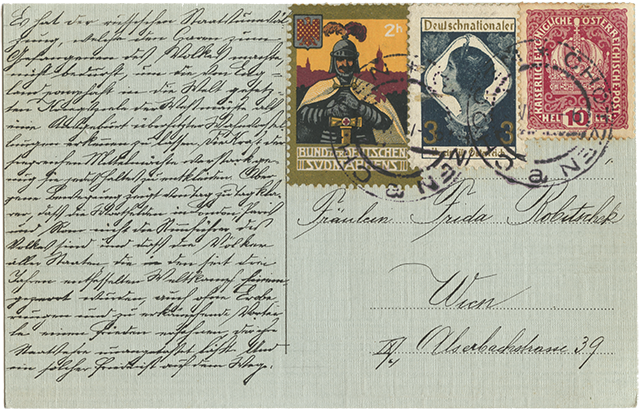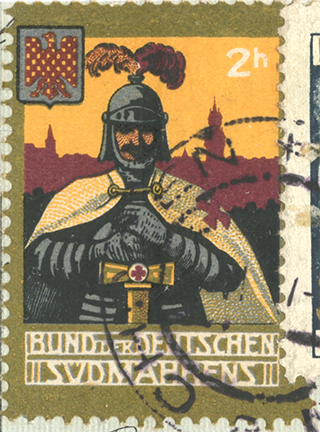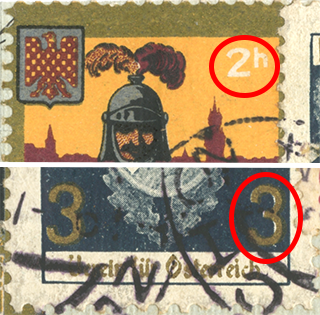
Home | Card Index | | | |
 Home | Card Index | | | | |
Eman Robitschek to Frida Robitschek - June 8, 1917Transcription and translation by Werner Sepper. |

|
 |

|
Though the wanderer in the poem is initially identified as being male, it is a woman wearing an impractical garment who is shown descending to the spring of peace in search of renewal. Happily, her feet are large and built for the journey. On the address side of the card, Eman uses a label of the Deutschnationaler Verein für Österreich (German National Association for Austria) that pictures a woman in a then modern hair style. The oak leaf embellishments around the portrait leave little doubt that the lady represented is Germania, the feminine embodiment of German culture and nationalism. The implication is that the lady on the front of the card also represents Germania, in her most open and vulnerable form, in search of the spring of peace on behalf of the entire Germanic world. Germania in the context of Eman's work. |

|
 |
 |

|
 |
|
Es hat der russischen Staatsumwälzung, welche den Czaren zum Gefangenen des Volkes machte, nicht bedurft, um die von England pomphaft in die Welt gesetzen Kriegsziele der Westmächte als eine Ausgeburt übersetzter Wahnvorstellungen erkennen zu lassen. Die Kraft der siegreichen Mittelmächte war stark genug sie jedes Haltes zu entkleiden. Aber jene Bewegung zeigt von Tag zu Tag klarer, dass die Worthelden in London, Paris und Rom nicht die Stimmführer des Volkes sind und dass die Völker aller Staaten, die in den seit drei Jahren entfesselten Weltkampf hineingezerrt wurden, auch ohne Eroberungen und zu erkämpfende Vorteile einen Frieden ersehnen, die ihre Staarsehere unangetastet lässt. Und ein solcher Friede ist auf dem Wege. |
|
|
It was not necessary to have a Russian state upheaval, which made the Tsar a prisoner of the people, to recognize the pompous dec- larations of the war aims by the Western Powers as a transformed monstrous birth of lunatic ideas. The powers of the victorious Central Powers were strong enough to unmask them of any preten- sions. But by that agitation it is clearly shown, day by day, that the word heroes in London, Paris and Rome do not represent the voice of the people and that the peoples of all states, that were forced into the three year old world fight, yearn for peace eyen without conquests and hard-won advantages, one that leaves their states honor untouched. And such a peace is underway. |
|

|
 |

|
The second political label on the address side of the card is a 2 heller stamp issued by the Bund der Deutschen Südmährens (League of Germans in South Moravia). South Moravia was then in what was northern Austria and regions immediately to its north. The League defended German language and culture, promoted instruction in German, and worked towards political unification with Germany. In June of 1917, when Eman wrote this card, the likely fate of Germans in South Moravia was far from clear. South Moravia was destined to suffer more casualties than any other Axis region. All its ethnic groups were positioning themselves for the end of the war. Russia was faltering and it's government would soon be overthrown, so German speakers in Austria and Moravia felt they had a strong hand, which is also reflected in Eman's essay. |
|
Eman, foreseeing the fall of Russia, thought that the public would demand peace from their leaders and support going back to the status quo prior to the outbreak of the war. His connections with the Südmährens propaganda stamp are three. |
|

|
 |

|
A note on label denomination You will notice that some labels shown on this website are denominated in specific currencies, such as hellers, as in the 2h example to the left. Others simply have a number with no currency specified. These are designed to be sold cross-border in two or more countries, most often Germany, Austria, and Czechoslovakia. |
|
last revised: 26 MAY 2014 |
|

|
 |
|
©2013-2014 by Charles M. Nelson All rights reserved. |